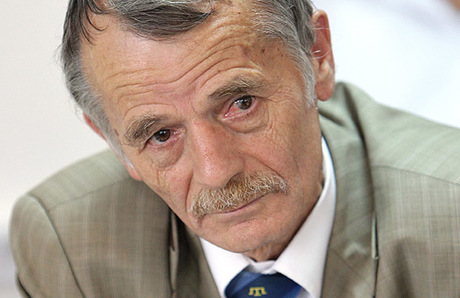
Crimean Crisis Increases Importance of Links Among Tatars
Publication: Eurasia Daily Monitor Volume: 11 Issue: 48
By:

Moscow had hoped that the Kazan Tatars would promote the Russian Federation’s agenda in Crimea both by appealing to the Crimean Tatars for calm and by dispelling the latter’s fears about Russia’s intentions. But as in so much of what is now defined as the Crimean crisis, the Kremlin’s policy has backfired. With each passing day, influence is flowing in the opposite direction, with the Crimean Tatars increasingly inspiring the Kazan Tatars and thereby transforming what had been a foreign policy problem for the Russian state into a potentially destabilizing domestic one. Indeed, Tatars have traditionally been looked to by other non-Russian groups living under Moscow’s control as a bellwether of the future.
Initially, as the Ukrainian crisis grew, Moscow’s plan seemed to be coming to fruition. The current and past presidents of Tatarstan, Rustem Minnikhanov and Mintimir Shaimiev, as well as the republic’s top Muslim and Russian Orthodox leaders all appealed for calm in public declarations and in a series of private telephone calls, subsequently reported on in both Kazan and Simferopol (islamsng.com/ukr/news/7626; islamrf.ru/news/russia/rusopinions/31358/; islamsng.com/rus/news/7620; islamrf.ru/news/russia/rusnews/31343/; islamrf.ru/news/russia/rusnews/31366/; grani.ru/Politics/World/Europe/Ukraine/m.225314.html).
Apparently at Moscow’s urging, the Tatarstan State Council met to discuss Crimea and immediately authorized delegations to travel to the Ukrainian peninsula to try to calm the situation. The speed with which this happened strongly suggests it was orchestrated—or at least viewed positively—by Moscow, which could have slowed things down otherwise. These delegations met both with Crimean Tatar leaders and with heads of the ethnic-Russian autonomy government there. A few days later, Kazan dispatched a planeload of cultural figures as part of a new effort to prevent the situation in Crimea from spiraling out of control. And there have been reports that Kazan is ready to offer the Crimean Tatars financial assistance, if they avoid rocking the boat (https://www.azatliq.org/content/article/25281089.html).
But almost immediately three gaps appeared between Kazan’s position and that of the Russian central government. First, nationalist groups in Kazan denounced Russian criticism of the Maidan protests in Ukraine and Moscow’s subsequent military moves, including the invasion of Ukraine’s Crimea (tatar-centr.blogspot.com/2014/03/blog-post_6147.html and nazaccent.ru/content/10874-tatarskie-nacionalisty-sudbu-poluostrova-dolzhny-reshat.html). Second, all Kazan Tatar officials opposed from the outset any threat to the territorial integrity of Ukraine, arguing that Ukraine, like the Russian Federation, is a multi-national state in which the interests of national groups—and Tatars in both, in particular—must be respected (interfax-religion.ru/islam/?act=news&div=54613). And third, Kazan commentators raised what must have been the most disturbing issue of all: They pointedly asked why Moscow was worried about autonomy beyond the borders of the Russian Federation when it has been doing so much to destroy autonomy within its own country (windowoneurasia2.blogspot.com/2014/02/window-on-eurasia-ukraine-is-as.html).
Over the last three days, all this has come to a head. Former Tatarstani president Shaimiev orchestrated what was supposed to be a meeting between Russian President Vladimir Putin and Mustafa Cemilev, the spiritual leader of the Crimean Tatars. That meeting did not happen: Cemilev, apparently unwilling to become a pawn in the Russian game, refused to meet, and Putin had to be satisfied with a telephone call in which he suggested that Ukraine’s independence in 1991 was not fully legitimate. Shaimiev did make contact with Cemilev, but the contents of their conversation yesterday (March 12) have not yet been made public (glavred.info/politika/dzhemilev-putin-esche-ne-reshil-chto-delat-s-krymom-273795.html; nazaccent.ru/content/10921-mintimer-shajmiev-vyletel-na-vstrechu-s.html; nazaccent.ru/content/10874-tatarskie-nacionalisty-sudbu-poluostrova-dolzhny-reshat.html).
In this fast-moving situation, three things are clear. First, the Crimean Tatars remain committed to staying within Ukraine, are not going to engage in violence although they may be subject to provocations, and are happy to have contact with the larger and politically influential Kazan Tatars—although the Crimean Tatars are not going to follow Kazan’s lead if Tatarstan shifts on the issue of the territorial integrity of Ukraine. The Crimean Tatars, having been victims of a forcible deportation by Moscow in 1944, have no desire to be part of the Russian Federation even if a Crimean Tatar Republic were on offer, something which Moscow could not re-establish without further compromising its argument as to why Russian forces are in Crimea to begin with.
Second, the fortitude of the Crimean Tatars is playing back into the politics of Kazan. By all accounts, Kazan Tatars are following developments in Crimea with greater care than they have devoted to almost any issue over the last generation. If Moscow tries to provoke the Crimean Tatars in order to justify an even more massive use of force, such a strategy will backfire in Kazan. Furthermore, if, by their discipline, the Crimean Tatars are able to carve out of the current crisis something for themselves, it seems likely that many in Kazan will want to follow their lead within Russia.
And third, and far and away the most important issue in this fast-moving situation, the political skills of the Tatarstani leadership are being tested. Until now, Kazan has made its way by walking Moscow’s line while working behind the scenes to promote autonomy. But what is currently happening in Crimea makes this more difficult and is likely to radicalize Kazan elites who undoubtedly fear they could lose their base of power if they do not take a stronger stand (aljazeera.com/indepth/opinion/2014/03/crimea-tatars-homeland-at-stake-2014355402511335.html).




